中国传统节日(活动)中英对照
中国传统节日(中英文对照)
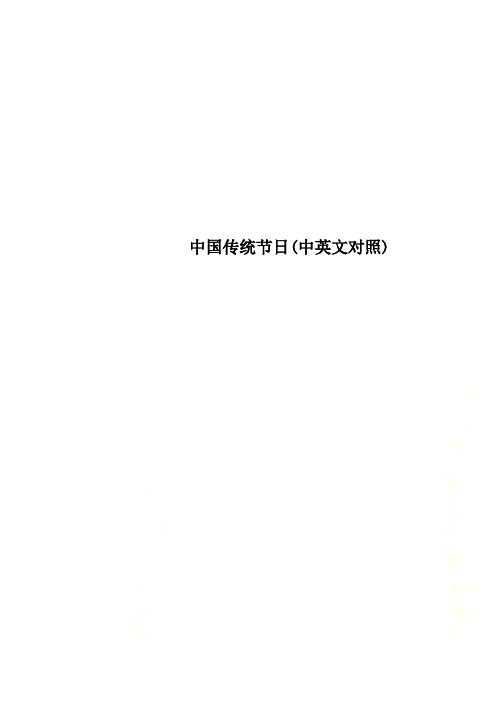
中国传统节日(中英文对照)中国传统节日(中英文对照简介)目录The Spring Festival(春节)Lantern Festival(元宵节)Qingming Festival(清明节)Dragon Boat Festival(端午节)Double Seventh Festival(七夕)Mid-Autumn Festival(中秋节)Double Ninth Festival(重阳节)Winter Solstice Festival(冬至)together to have dinner while watching TV programs.For Chinese at home and abroad, the Spring Festival is always the most important festival.农历的正(zheng)月初一,是中国的农历新年。
在中国的传统节日中,这是一个最重要、最热闹的节日。
因为过农历新年的时候,正是冬末春初,所以人们也把这个节日叫“春节”。
中国人过春节有很多传统习俗。
从腊月二十三起,人们就开始准备过年了。
在这段时间里,家家户户要大扫除,买年货,贴窗花,挂年画,写春联,蒸年糕,做好各种食品,准备辞旧迎新。
春节的前夜叫“除夕”。
除夕之夜,是家人团聚的时候。
一家人围坐在一起,吃一顿丰盛的年夜饭,说说笑笑,直到天亮,这叫守岁。
除夕零点的钟声一响,人们还要吃饺子。
古时候叫零点为“子时”,除夕的子时正是新旧年交替的时候,人们在这时吃饺子,是取“更岁交子”的意思。
这也是“饺子”名称的由来。
过了除夕就是大年初一。
从初一开始,人们要走亲戚、看朋友,互相拜年。
拜年,是春节的重要习俗。
拜年时,大家都要说一些祝愿幸福、健康的吉祥话。
放爆竹是春节期间孩子们最喜欢的活动。
传说燃放爆竹可以驱妖除魔,所以每年从除夕之夜起,到处就响起了接连不断的爆竹声。
阵阵烟花,声声爆竹,给节日增添了喜庆的气氛。
中国主要节日中英文对照表
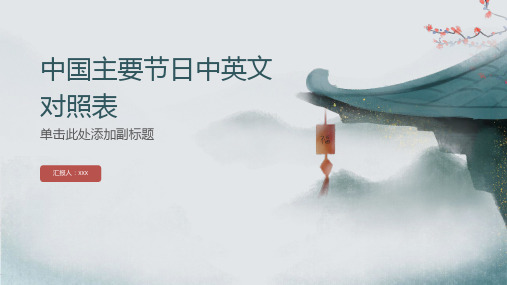
教师节(Teachers' Day)
第四章
中国佛教节日
佛诞节(Buddha's Birthday)
节日时间:农历四月初八
节日起源:纪念释迦牟尼 佛诞生
节日习俗:浴佛、放生、 吃斋、诵经
节日意义:弘扬佛教文化, 传承佛教精神
成道节(Enlightenment Day)
节日时间:农历十二月初八
节日习俗:吃腊八粥、放生、诵经、 拜佛
添加标题
添加标题
节日起源:纪念释迦牟尼成道
添加标题
添加标题
节日意义:弘扬佛教文化,传承佛 教精神
涅槃节(Nirvana Day)
节日时间:农历二月十五日
节日意义:纪念释迦牟尼佛涅槃的日子
节日习俗:诵经、拜佛、放生、布施等
与其他佛教节日的关系:与佛陀诞生日(Vesak Day)、佛陀成道日(Buddha Day)并称 为佛教三大节日
节日意义:庆祝春 天的到来,祈求丰 收
节日活动:祭祀、 歌舞、游戏
特色美食:糯米饭 、粽子、米酒
第三章
中国现代节日
劳动节(Labor Day)
节日时间:每年5月1日 节日意义:庆祝劳动人民的辛勤工作和贡献 节日活动:放假、旅游、购物、家庭聚会等 相关词汇:劳动、工人、假期、庆祝、贡献等
国庆节(National Day)
节日意义:庆祝中华人民共 和国成立
节日活动:举行盛大的阅兵 仪式和庆祝活动
节日时间:10月1日
节日习俗:挂国旗、唱国歌、 放烟花、旅游等
儿童节(Children's Day)
节日时间:6 月1日ຫໍສະໝຸດ 节日意义:庆 祝儿童的快乐
和成长
节日活动:亲 子活动、学校 庆祝活动、儿 童才艺展示等
中国节日和纪念日大全中英文对照

中国节日和纪念日大全中英文对照中国是一个拥有悠久历史和丰富文化传统的国家。
随着时间的推移,中国人民逐渐形成了一系列的节日和纪念日,这些节日和纪念日不仅彰显了中华民族的传统习俗和价值观,也深刻地体现了中国人民的情感和文化认同。
下面将为大家介绍一些中国的重要节日和纪念日。
春节 (Spring Festival)春节是中国最重要、最古老的传统节日,同时也是全球华人的共同节庆。
通常在农历正月初一庆祝,持续15天。
人们会贴春联、燃放鞭炮、赏灯笼、游行舞龙舞狮等。
家人会团聚共进年夜饭,并进行拜年、赏红包等传统活动。
春节的主题是辞旧迎新,代表着热烈的欢庆和祝福。
清明节 (Tomb-Sweeping Day)清明节通常在农历四月初四或五,是中国传统的祭祀节日。
人们会前往祖先墓地扫墓,并献上鲜花、食品以及纸钱等祭品。
此外,还有一项重要的传统活动是踏青,人们会外出郊游,欣赏春天的美景,感受大自然的生机。
端午节 (Dragon Boat Festival)端午节是为了纪念中国古代爱国诗人屈原而设立的节日,通常在农历五月初五。
此时,人们会赛龙舟、吃粽子,还有一项独特的活动——挂艾叶,以驱邪避病。
端午节是中华民族优秀传统文化的重要组成部分,也被联合国列入世界非遗名录。
中秋节 (Mid-Autumn Festival)中秋节是一个家庭团聚的节日,通常在农历八月十五。
人们会赏月、吃月饼、赏菊花等。
中秋节的核心是月亮,代表着团聚和祝福。
此外,也有丰富多样的民间故事和传说与中秋节相关联,如嫦娥奔月、吴刚伐桂等。
国庆节 (National Day)国庆节是中国的国家节日,于每年的十月一日庆祝,持续7天。
这是一个庆祝中华人民共和国成立的节日,人们会进行各种形式的庆祝活动,如升国旗仪式、阅兵式、文艺演出等。
国庆节是中国人民爱国主义情感的集中表达,也是对中华民族伟大历史和深厚文化底蕴的庆祝。
五四青年节 (Youth Day)五四青年节是为了纪念1919年五四运动而设立的节日,同时也是世界青年节。
中国传统节日(中英文对照)
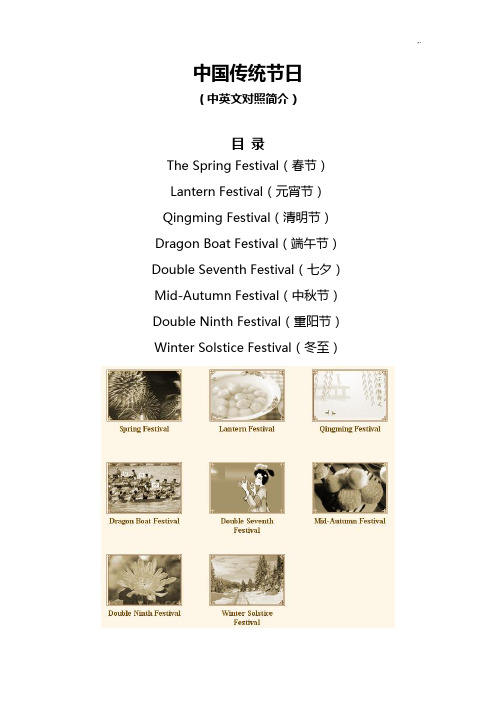
中国传统节日(中英文对照简介)目录The Spring Festival(春节)Lantern Festival(元宵节)Qingming Festival(清明节)Dragon Boat Festival(端午节)Double Seventh Festival(七夕)Mid-Autumn Festival(中秋节)Double Ninth Festival(重阳节)Winter Solstice Festival(冬至)The Spring Festival(春节)The first day of the first lunar month is the New Year in the Chinese lunar calendar. Among the traditional Chinese festivals, this is the most important and the most bustling. Since it occurs at the end of winter and the beginning of spring, people also call it the Spring Festival.Chinese have many traditional customs relating to the Spring Festival. Since the 23rd day of the 12th lunar montha, people start to prepare for the event. Every family will undertake thorough cleaning, do their Spring Festival shopping, create paper-cuts for window decoration, put up New Year picturesb, write Spring Festival coupletsc, make New Year cakesd, and also prepare all kinds of food to bid farewell to the old and usher in the new.New Year's Eve is the time for a happy reunion of all family members, when they sit around the table to have a sumptuous New Year's Eve dinner, talking and laughing, until daybreak, which is called "staying up to see the year out". When the bell tolls midnight on New Year's Eve, people eat dumplings. In ancient times, midnight was called zishi (a period of the day from 11 p.m. to 1 a.m.). Dumplings (jiaozi) are eaten because it sounds the same as "change of the year and the day" in Chinese.From the first day of the lunar year, people pay New Year calls on relatives and friends, which is an important custom for the Spring Festival.Setting off firecrackers is the favorite activity of children in the Spring Festival. According to legend, this could drive off evil spirits. The continuous sound of firecrackers can be heard everywhere, adding to the atmosphere of rejoicing and festivity.Many places hold temple fairs. The wonderful dragon lantern dance and the lion dance performances, along with various handicraft articles and local snacks attract thousands of people.With the development of the times, some changes have taken place inthe customs of spending the Spring Festival. For example, to prevent environmental pollution, many cities have banned firecrackers. But this does not have an impact on the happy atmosphere of the festival. On New Year's Eve, family members get together to have dinner while watching TV programs.For Chinese at home and abroad, the Spring Festival is always the most important festival.农历的正(zheng)月初一,是中国的农历新年。
中国传统节日中英文对照
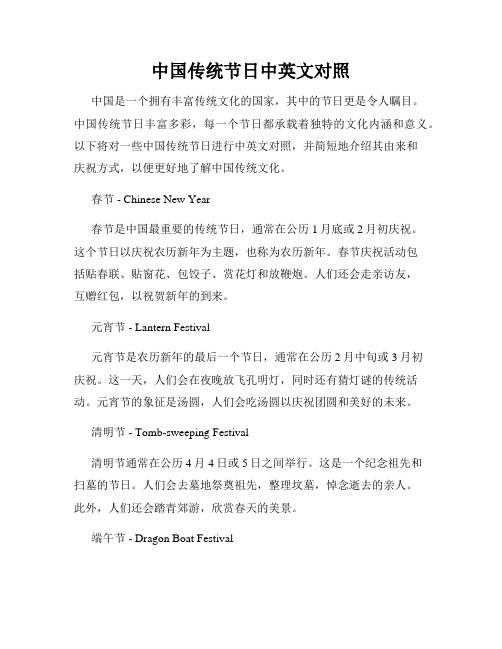
中国传统节日中英文对照中国是一个拥有丰富传统文化的国家,其中的节日更是令人瞩目。
中国传统节日丰富多彩,每一个节日都承载着独特的文化内涵和意义。
以下将对一些中国传统节日进行中英文对照,并简短地介绍其由来和庆祝方式,以便更好地了解中国传统文化。
春节 - Chinese New Year春节是中国最重要的传统节日,通常在公历1月底或2月初庆祝。
这个节日以庆祝农历新年为主题,也称为农历新年。
春节庆祝活动包括贴春联、贴窗花、包饺子、赏花灯和放鞭炮。
人们还会走亲访友,互赠红包,以祝贺新年的到来。
元宵节 - Lantern Festival元宵节是农历新年的最后一个节日,通常在公历2月中旬或3月初庆祝。
这一天,人们会在夜晚放飞孔明灯,同时还有猜灯谜的传统活动。
元宵节的象征是汤圆,人们会吃汤圆以庆祝团圆和美好的未来。
清明节 - Tomb-sweeping Festival清明节通常在公历4月4日或5日之间举行。
这是一个纪念祖先和扫墓的节日。
人们会去墓地祭奠祖先,整理坟墓,悼念逝去的亲人。
此外,人们还会踏青郊游,欣赏春天的美景。
端午节 - Dragon Boat Festival端午节是一个具有悠久历史的节日,通常在公历6月初庆祝。
这个节日源于纪念古代爱国诗人屈原,也是一项庆祝夏天到来的活动。
人们会参加龙舟赛、包粽子和挂艾草。
象征食物是粽子,人们吃粽子以保护自己免受邪恶和疾病的侵袭。
中秋节 - Mid-Autumn Festival中秋节是农历八月十五,通常在公历9月底或10月初庆祝。
这个节日庆祝秋天的丰收和团圆。
人们会赏月、品尝月饼以及举办家庭聚会。
月饼是中秋节的特色食物,馅料的种类多样,寓意着团圆和祝福。
重阳节 - Double Ninth Festival重阳节通常在公历9月初或10月底庆祝,也被称为老人节。
此节日的由来与古代传说有关,人们会爬山、采菊、追溯阳光,并祝福年长的亲人和朋友。
重阳节也是缅怀祖先和尊重老年人的时间。
中国文化中英文对照
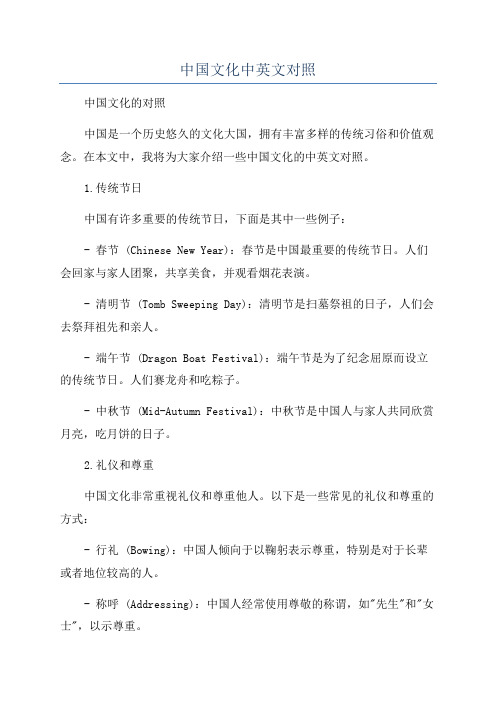
中国文化中英文对照中国文化的对照中国是一个历史悠久的文化大国,拥有丰富多样的传统习俗和价值观念。
在本文中,我将为大家介绍一些中国文化的中英文对照。
1.传统节日中国有许多重要的传统节日,下面是其中一些例子:- 春节 (Chinese New Year):春节是中国最重要的传统节日。
人们会回家与家人团聚,共享美食,并观看烟花表演。
- 清明节 (Tomb Sweeping Day):清明节是扫墓祭祖的日子,人们会去祭拜祖先和亲人。
- 端午节 (Dragon Boat Festival):端午节是为了纪念屈原而设立的传统节日。
人们赛龙舟和吃粽子。
- 中秋节 (Mid-Autumn Festival):中秋节是中国人与家人共同欣赏月亮,吃月饼的日子。
2.礼仪和尊重中国文化非常重视礼仪和尊重他人。
以下是一些常见的礼仪和尊重的方式:- 行礼 (Bowing):中国人倾向于以鞠躬表示尊重,特别是对于长辈或者地位较高的人。
- 称呼 (Addressing):中国人经常使用尊敬的称谓,如"先生"和"女士",以示尊重。
- 饮食礼仪 (Dining Etiquette):在中国,礼仪是饮食文化中不可缺少的一部分。
例如,在用筷子吃饭时,不应该插在饭碗中立起来,因为这会被视为不吉利的行为。
3.文物和建筑中国拥有世界上许多著名的文物和建筑,代表着悠久的历史和独特的文化。
- 长城 (Great Wall):长城是中国最著名的建筑之一,也是世界七大奇迹之一、它是中国古代的防御工事,总长超过21,000公里。
- 故宫 (The Forbidden City):故宫是位于北京的一座宫殿建筑,曾是明清两代24位皇帝的居住地,也是中国历史最长久、规模最大的古代宫殿建筑。
- 兵马俑 (Terracotta Warriors and Horses):兵马俑是位于西安的陶制兵器和马匹的雕像,是中国第一位皇帝秦始皇的陪葬品。
中国传统节日及活动英译
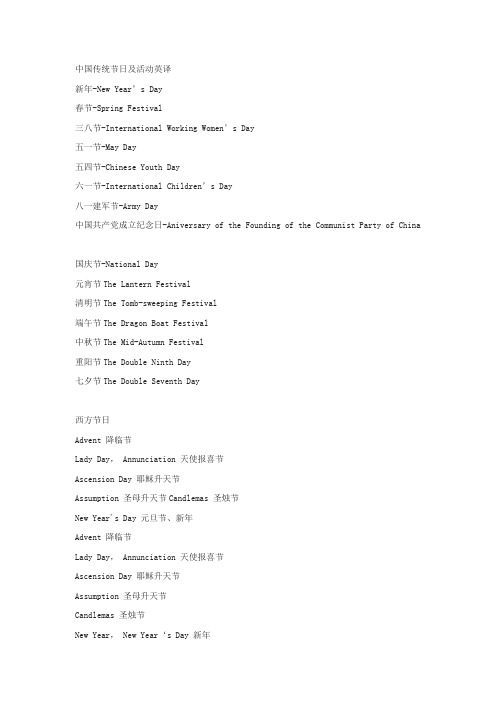
中国传统节日及活动英译新年-New Year’s Day春节-Spring Festival三八节-International Working Women’s Day五一节-May Day五四节-Chinese Youth Day六一节-International Children’s Day八一建军节-Army Day中国共产党成立纪念日-Aniversary of the Founding of the Communist Party of China国庆节-National Day元宵节The Lantern Festival清明节The Tomb-sweeping Festival端午节The Dragon Boat Festival中秋节The Mid-Autumn Festival重阳节The Double Ninth Day七夕节The Double Seventh Day西方节日Advent 降临节Lady Day, Annunciation 天使报喜节Ascension Day 耶稣升天节Assumption 圣母升天节Candlemas 圣烛节New Year's Day 元旦节、新年Advent 降临节Lady Day, Annunciation 天使报喜节Ascension Day 耶稣升天节Assumption 圣母升天节Candlemas 圣烛节New Year,New Year‘s Day 新年Corpus Christi 圣体节Quadragesima 四旬节Lent 四旬斋,大斋期Low Sunday,复活节后第一个星期日All Souls‘Day 万灵节Palm Sunday 棕枝全日Easter Sunday, Easter 复活节Epiphany, Twelfth Day 主显节day of obligation 每人需停止工作参加礼拜的日子Maundy Thursday 濯足星期四Shrove Tuesday 忏悔节Ash Wednesday 复活节前的第七个星期三Christmas 圣诞节Christmas Eve 圣诞前夕New Year‘s Eve 新年前夕Easter 复活节Whitsun, Whitsuntide 圣神降临周Quinquagesima 四旬斋前的星期日Ramadan 斋月Rogation Days 祈祷节Sabbath 安息日Feast of the Sacred Heart 圣心节Midsummer Day 施洗约翰节Passion Week 复活节前第二周Holy Week 圣周Septuagesima 四旬斋前的第三个星期日Sexagesima 四旬斋前的第二个星期日Ember Days 四季节All Saints‘ Day 万圣节Trinity Sunday, Trinity 圣三主日Good Friday 耶稣受难节Visitation 圣母往见节,成人节ADULTS DAY情人节ST.VALENTINE‘S DAY狂欢节CARNIVAL桃花节PEACH FLOWER FESTIVAL-INTERNATIONAL WOMEN‘S DAY 愚人节APRIL FOOL‘S DAY复活节EASTER食品节FOOD FESTIVAL国际劳动节INTERNATIONAL LABOUR DAY男孩节BOY‘S DAY母亲节MOTHER‘S DAY开斋节LESSER BAIRAM银行休假日BANK HOLIDAY国际儿童节INTERNATIONAL CHILDREN‘S DAY父亲节FATHER‘S DAY教师节TEACHER‘S DAY啤酒节OKTOBERFEST南瓜节PUMPKIN DAY鬼节HALLOWEEN万圣节HALLOWMAS感恩节THANKSGIVING护士节NRUSE DAYCorpus Christi 圣体节Quadragesima 四旬节Lent 四旬斋,大斋期Low Sunday,复活节后第一个星期日All Souls‘Day 万灵节Palm Sunday 棕枝全日Easter Sunday, Easter 复活节Epiphany, Twelfth Day 主显节day of obligation 每人需停止工作参加礼拜的日子Maundy Thursday 濯足星期四Shrove Tuesday 忏悔节Ash Wednesday 复活节前的第七个星期三Christmas 圣诞节Christmas Eve 圣诞前夕New Year‘s Eve 新年前夕Easter 复活节Whitsun, Whitsuntide 圣神降临周Quinquagesima 四旬斋前的星期日Ramadan 斋月Rogation Days 祈祷节Sabbath 安息日Feast of the Sacred Heart 圣心节Midsummer Day 施洗约翰节Passion Week 复活节前第二周Holy Week 圣周Septuagesima 四旬斋前的第三个星期日Sexagesima 四旬斋前的第二个星期日Ember Days 四季节All Saints‘ Day 万圣节Trinity Sunday, Trinity 圣三主日Good Friday 耶稣受难节Visitation 圣母往见节,其它活动节日世界消费者权益日--WORLD CONSUMER RIGHT DAY 世界水日-----WORLD WATER DAY世界卫生日-----WORLD HEALTH DAY世界地球日-----WORLD EARTH DAY世界住房日--WORLD HOUSING DAY国际秘书节----INTERNATIONAL SECRETARY DAY国际红十字日----INTERNATIONAL RED-CROSS DAY 世界电信日----WORLD TELECOMMUNICATIONS DAY 世界无烟日----WORLD NO-SMOKING DAY世界环境日----WORLD ENVIRONMENT DAY世界人口日---WORLD POPULATION DAY世界旅游日----WORLD TOURISM DAY世界邮政日----WORLD POST DAY世界粮食日-----WORLD GRAIN DAY世界爱滋病日-----WORLD AIDS DAY世界残疾日------WORLD DISABLED DAY。
中国传统节日(中英文对照)

中国传统节日(中英文对照简介)目录The Spring Festival(春节)Lantern Festival(元宵节)Qingming Festival(清明节)Dragon Boat Festival(端午节)Double Seventh Festival(七夕)Mid-Autumn Festival(中秋节)Double Ninth Festival(重阳节)Winter Solstice Festival(冬至)The Spring Festival(春节)The first day of the first lunar month is the New Year in the Chinese lunar calendar. Among the traditional Chinese festivals, this is the most important and the most bustling. Since it occurs at the end of winter and the beginning of spring, people also call it the Spring Festival.Chinese have many traditional customs relating to the Spring Festival. Since the 23rd day of the 12th lunar montha, people start to prepare for the event. Every family will undertake thorough cleaning, do their Spring Festival shopping, create paper-cuts for window decoration, put up New Year picturesb, write Spring Festival coupletsc, make New Year cakesd, and also prepare all kinds of food to bid farewell to the old and usher in the new.New Year's Eve is the time for a happy reunion of all family members, when they sit around the table to have a sumptuous New Year's Eve dinner, talking and laughing, until daybreak, which is called "staying up to see the year out". When the bell tolls midnight on New Year's Eve, people eat dumplings. In ancient times, midnight was called zishi (a period of the day from 11 p.m. to 1 a.m.). Dumplings (jiaozi) are eaten because it sounds the same as "change of the year and the day" in Chinese.From the first day of the lunar year, people pay New Year calls on relatives and friends, which is an important custom for the Spring Festival.Setting off firecrackers is the favorite activity of children in the Spring Festival. According to legend, this could drive off evil spirits. The continuous sound of firecrackers can be heard everywhere, adding to the atmosphere of rejoicing and festivity.Many places hold temple fairs. The wonderful dragon lantern dance and the lion dance performances, along with various handicraft articles and local snacks attract thousands of people.With the development of the times, some changes have taken place in the customs of spending the Spring Festival. For example, to prevent environmental pollution, many cities have banned firecrackers. But this does not have an impact on the happy atmosphere of the festival. On New Year's Eve, family members get together to have dinner while watching TV programs.For Chinese at home and abroad, the Spring Festival is always the most important festival.农历的正(zheng)月初一,是中国的农历新年。
中国传统节日和活动的英语表达
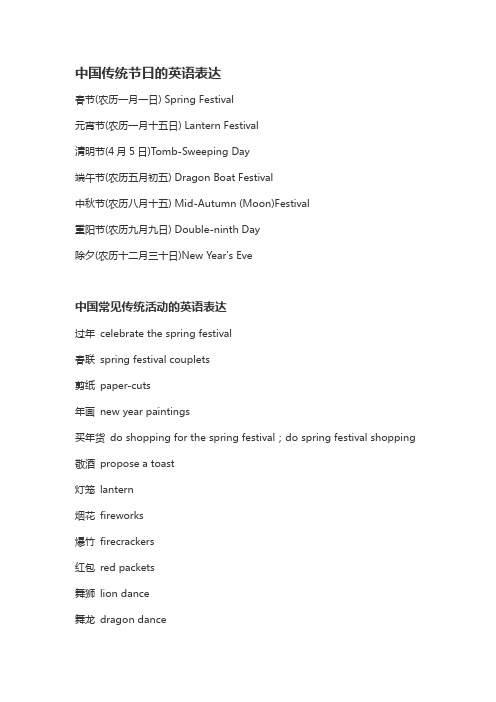
中国传统节日的英语表达春节(农历一月一日) Spring Festival元宵节(农历一月十五日) Lantern Festival清明节(4月5日)Tomb-Sweeping Day端午节(农历五月初五) Dragon Boat Festival中秋节(农历八月十五) Mid-Autumn (Moon)Festival重阳节(农历九月九日) Double-ninth Day除夕(农历十二月三十日)New Year's Eve中国常见传统活动的英语表达过年celebrate the spring festival春联spring festival couplets剪纸paper-cuts年画new year paintings买年货do shopping for the spring festival;do spring festival shopping 敬酒propose a toast灯笼lantern烟花fireworks爆竹firecrackers红包red packets舞狮lion dance舞龙dragon dance戏曲traditional opera杂耍variety show灯谜riddles written on lanterns灯会exhibit of lanterns守岁staying-up拜年pay new year's call;give new year's greetings;pay new year's visit 禁忌taboo去晦气get rid of the ill- fortune祭祖宗offer sacrifices to one's ancestors压岁钱gift money辞旧岁bid farewell to the old year扫房spring cleaning; general house-cleaning年糕nian-gao; rise cake; new year cake团圆饭family reunion dinner年夜饭the dinner on new year's eve饺子jiao-zi/dumpling粽子rice dumpling。
中外传统节日中英对照
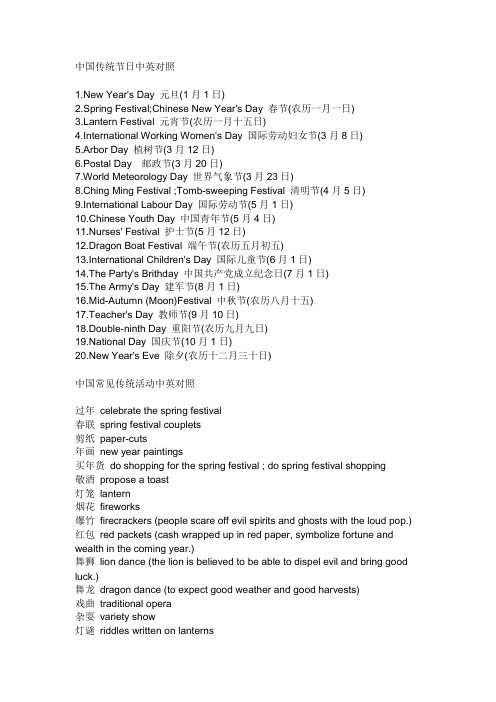
中国传统节日中英对照1.New Year's Day 元旦(1月1日)2.Spring Festival;Chinese New Year's Day 春节(农历一月一日)ntern Festival 元宵节(农历一月十五日)4.International Working Women's Day 国际劳动妇女节(3月8日)5.Arbor Day 植树节(3月12日)6.Postal Day 邮政节(3月20日)7.World Meteorology Day 世界气象节(3月23日)8.Ching Ming Festival ;Tomb-sweeping Festival 清明节(4月5日)9.International Labour Day 国际劳动节(5月1日)10.Chinese Youth Day 中国青年节(5月4日)11.Nurses' Festival 护士节(5月12日)12.Dragon Boat Festival 端午节(农历五月初五)13.International Children's Day 国际儿童节(6月1日)14.The Party's Brithday 中国共产党成立纪念日(7月1日)15.The Army's Day 建军节(8月1日)16.Mid-Autumn (Moon)Festival 中秋节(农历八月十五)17.Teacher's Day 教师节(9月10日)18.Double-ninth Day 重阳节(农历九月九日)19.National Day 国庆节(10月1日)20.New Year's Eve 除夕(农历十二月三十日)中国常见传统活动中英对照过年celebrate the spring festival春联spring festival couplets剪纸paper-cuts年画new year paintings买年货do shopping for the spring festival ; do spring festival shopping敬酒propose a toast灯笼lantern烟花fireworks爆竹firecrackers (people scare off evil spirits and ghosts with the loud pop.) 红包red packets (cash wrapped up in red paper, symbolize fortune and wealth in the coming year.)舞狮lion dance (the lion is believed to be able to dispel evil and bring good luck.)舞龙dragon dance (to expect good weather and good harvests)戏曲traditional opera杂耍variety show灯谜riddles written on lanterns灯会exhibit of lanterns守岁staying-up拜年pay new year's call; give new year's greetings; pay new year's visit禁忌taboo去晦气get rid of the ill- fortune祭祖宗offer sacrifices to one's ancestors压岁钱gift money; money given to children as a lunar new year gift culture note: in the old days, new year's money was given in the form of one hundred copper coins strung together on a red string and symbolized the hope that one would live to be a hundred years old. today, money is placed inside red envelopes in denominations considered auspicious and given to represent luck and wealth辞旧岁bid farewell to the old year扫房spring cleaning; general house-cleaning年糕nian-gao; rise cake; new year cake团圆饭family reunion dinner年夜饭the dinner on new year's eve饺子 jiao-zi; chinese meat ravioli••美国1.元旦节(New Year's Day),每年1月1日庆祝新的一年开始。
中国传统节日英文名称

春节(农历正月初一)—— Spring Festival除夕 New Year's Evening正月 lunar January初一 the beginning of New Year元宵节 (农历正月十五) Lantern Festival端午节 (农历五月初五——the fifth day of the lunar month) Duan Wu FestivalorDragon Boat Festival(龙舟节)清明节Qing Ming Festival中秋节 (农历八月十五) Mid-Autumn Chinese Festival重阳节 (农历九月初九)Chung Yang Festival or Double-ninth Day腊八节 (农历腊月初八)the laba Rice Porridge Festival中国常见传统活动中英对照过年 celebrate the spring festival春联 spring festival couplets剪纸 paper-cuts年画 new year paintings买年货do shopping for the spring festival;ORdo spring festival shopping敬酒 propose a toast灯笼 lantern烟花fireworks爆竹 firecrackers (people scare off evil spirits and ghosts with the loud pop.)红包red packets舞狮 lion dance(the lion is believed to be able to dispel evil and bring good luck.) 舞龙dragon dance(to expect good weather and good harvests)戏曲 traditional opera杂耍 variety show灯谜 riddles written on lanterns灯会 exhibit of lanterns守岁 staying-up拜年 pay new year's call / give new year's greetings / pay new year's visit禁忌 taboo去晦气 get rid of the ill- fortune祭祖宗 Offer sacrifices to one's ancestors压岁钱 gift money or money given to children as a lunar new year gift culture note;辞旧岁 bid farewell to the old year扫房 spring cleaning ; general house-cleaning年糕nian-gao; rise cake; new year cake团圆饭 family reunion dinner年夜饭the dinner on new year's eve饺子 dumpling; Chinese meat ravioli粽子 rice dumpling闰年leap year十二生肖zodiac。
中国传统节日英文对照
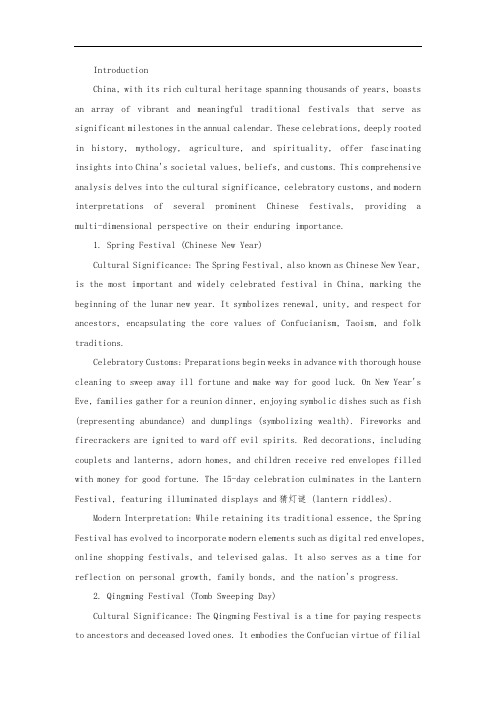
IntroductionChina, with its rich cultural heritage spanning thousands of years, boasts an array of vibrant and meaningful traditional festivals that serve as significant milestones in the annual calendar. These celebrations, deeply rooted in history, mythology, agriculture, and spirituality, offer fascinating insights into China's societal values, beliefs, and customs. This comprehensive analysis delves into the cultural significance, celebratory customs, and modern interpretations of several prominent Chinese festivals, providing a multi-dimensional perspective on their enduring importance.1. Spring Festival (Chinese New Year)Cultural Significance: The Spring Festival, also known as Chinese New Year, is the most important and widely celebrated festival in China, marking the beginning of the lunar new year. It symbolizes renewal, unity, and respect for ancestors, encapsulating the core values of Confucianism, Taoism, and folk traditions.Celebratory Customs: Preparations begin weeks in advance with thorough house cleaning to sweep away ill fortune and make way for good luck. On New Year's Eve, families gather for a reunion dinner, enjoying symbolic dishes such as fish (representing abundance) and dumplings (symbolizing wealth). Fireworks and firecrackers are ignited to ward off evil spirits. Red decorations, including couplets and lanterns, adorn homes, and children receive red envelopes filled with money for good fortune. The 15-day celebration culminates in the Lantern Festival, featuring illuminated displays and猜灯谜 (lantern riddles).Modern Interpretation: While retaining its traditional essence, the Spring Festival has evolved to incorporate modern elements such as digital red envelopes, online shopping festivals, and televised galas. It also serves as a time for reflection on personal growth, family bonds, and the nation's progress.2. Qingming Festival (Tomb Sweeping Day)Cultural Significance: The Qingming Festival is a time for paying respects to ancestors and deceased loved ones. It embodies the Confucian virtue of filialpiety and the Taoist belief in the interconnectedness of life and death.Celebratory Customs: Families visit ancestral graves,清扫墓地 (sweeping the tomb), offering food, wine, and paper offerings, and burning joss sticks and paper money. Some engage in kite flying, symbolizing the release of misfortune and the ascent of the soul to heaven. The consumption of 清明团子(Qingming rice balls) or 蒸糕 (steamed cakes) is also customary.Modern Interpretation: In recent years, eco-friendly alternatives to paper offerings and fireworks have gained popularity due to environmental concerns. Online memorial platforms allow distant relatives to pay virtual tributes, reflecting the integration of technology into this age-old tradition.3. Dragon Boat Festival (Duanwu Festival)Cultural Significance: The Dragon Boat Festival commemorates the death of the ancient poet Qu Yuan, who drowned himself in protest against political corruption. It is also associated with warding off disease and evil spirits, reflecting the belief in the seasonal transition from yang to yin energy.Celebratory Customs: The highlight of the festival is the thrilling dragon boat races, where teams paddle vibrantly decorated boats to the beat of drums. Zongzi, glutinous rice dumplings wrapped in bamboo leaves, are eaten as a tribute to Qu Yuan and to symbolize unity. Wearing perfumed sachets and hanging mugwort and calamus on doors are traditional practices believed to dispel evil and promote health.Modern Interpretation: The Dragon Boat Festival has become an international sporting event, fostering cultural exchange and friendship among nations. Zongzi varieties have diversified, incorporating modern flavors and ingredients, while the festival's themes of loyalty, patriotism, and health continue to resonate in contemporary society.4. Mid-Autumn FestivalCultural Significance: The Mid-Autumn Festival, occurring when the moon is at its fullest and brightest, celebrates the harvest, family reunion, and the harmony between nature and humanity. It is steeped in myths, such as Chang'eflying to the moon and the Jade Rabbit pounding medicine.Celebratory Customs: Family gatherings, often accompanied by outdoor moon-viewing activities, are central to the celebration. Mooncakes, round pastries filled with various sweet or savory fillings, are shared among loved ones as a symbol of unity and completeness. Lantern displays, folk dances, and traditional performances enrich the festive atmosphere.Modern Interpretation: Mooncake flavors and designs have undergone significant innovation, incorporating Western influences and catering to diverse dietary preferences. Online mooncake gift-giving and virtual moon-viewing events have emerged in response to the digital age, while the festival's themes of gratitude, unity, and ecological awareness remain pertinent.5. Double Ninth Festival (Chongyang Festival)Cultural Significance: The Double Ninth Festival, observed on the ninth day of the ninth lunar month, is dedicated to venerating the elderly and promoting longevity. It is associated with the concept of yang energy ascending, symbolizing positive vibes and good health.Celebratory Customs: Climbing mountains, carrying 茱萸 (dogwood sprigs) and 插茱萸 (inserting dogwood sprigs into hair or clothing) are traditional activities believed to ward off illness and misfortune. Chongyang cake, a layered pastry, is consumed for good luck and longevity.Modern Interpretation: The festival has evolved into a national day for respecting and caring for the elderly, with various community events and activities organized. It emphasizes the importance of intergenerational bonding and raises awareness about the needs of the aging population in modern society.ConclusionTraditional Chinese festivals, each unique in their cultural significance, celebratory customs, and modern interpretations, collectively form a tapestry of rituals and traditions that reflect the nation's profound historical, philosophical, and spiritual roots. Despite the passage of time and the influenceof modernity, these festivals persist as vital touchstones of Chinese identity, fostering social cohesion, preserving cultural heritage, and adapting to contemporary contexts. As China continues to evolve, its traditional festivals will undoubtedly remain integral to the nation's collective psyche, serving as living repositories of its rich cultural legacy.。
中国传统节日(中英对照)
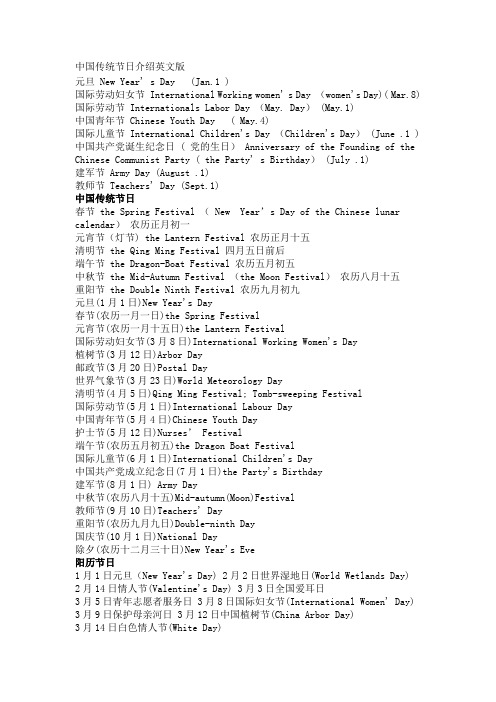
中国传统节日介绍英文版元旦 New Year' s Day (Jan.1 )国际劳动妇女节 International Working women' s Day (women's Day)( Mar.8) 国际劳动节 Internationals Labor Day (May. Day) (May.1)中国青年节 Chinese Youth Day ( May.4)国际儿童节 International Children's Day (Children's Day) (June .1 ) 中国共产党诞生纪念日 ( 党的生日) Anniversary of the Founding of the Chinese Communist Party ( the Party' s Birthday) (July .1)建军节 Army Day (August .1)教师节 Teachers' Day (Sept.1)中国传统节日春节 the Spring Festival ( New Year’s Day of the Chinese lunar calendar)农历正月初一元宵节(灯节) the Lantern Festival 农历正月十五清明节 the Qing Ming Festival 四月五日前后端午节 the Dragon-Boat Festival 农历五月初五中秋节 the Mid-Autumn Festival (the Moon Festival)农历八月十五重阳节 the Double Ninth Festival 农历九月初九元旦(1月1日)New Year's Day春节(农历一月一日)the Spring Festival元宵节(农历一月十五日)the Lantern Festival国际劳动妇女节(3月8日)International Working Women's Day植树节(3月12日)Arbor Day邮政节(3月20日)Postal Day世界气象节(3月23日)World Meteorology Day清明节(4月5日)Qing Ming Festival; Tomb-sweeping Festival国际劳动节(5月1日)International Labour Day中国青年节(5月4日)Chinese Youth Day护士节(5月12日)Nurses’ Festival端午节(农历五月初五)the Dragon Boat Festival国际儿童节(6月1日)International Children's Day中国共产党成立纪念日(7月1日)the Party's Birthday建军节(8月1日) Army Day中秋节(农历八月十五)Mid-autumn(Moon)Festival教师节(9月10日)Teachers' Day重阳节(农历九月九日)Double-ninth Day国庆节(10月1日)National Day除夕(农历十二月三十日)New Year's Eve阳历节日1月1日元旦(New Year's Day) 2月2日世界湿地日(World Wetlands Day)2月14日情人节(Valentine's Day) 3月3日全国爱耳日3月5日青年志愿者服务日 3月8日国际妇女节(International Women' Day) 3月9日保护母亲河日 3月12日中国植树节(China Arbor Day)3月14日白色情人节(White Day)3月14日国际警察日(International Policemen' Day)3月15日世界消费者权益日(World Consumer Right Day)3月21日世界森林日(World Forest Day)3月21日世界睡眠日(World Sleep Day)3月22日世界水日(World Water Day)3月23日世界气象日(World Meteorological Day)3月24日世界防治结核病日(World Tuberculosis Day)4月1日愚人节(April Fools' Day)4月5日清明节(Tomb-sweeping Day)4月7日世界卫生日(World Health Day)4月22日世界地球日(World Earth Day)4月26日世界知识产权日(World Intellectual Property Day)5月1日国际劳动节(International Labor Day)5月3日世界哮喘日(World Asthma Day)5月4日中国青年节(Chinese Youth Day)5月8日世界红十字日(World Red-Cross Day)5月12日国际护士节(International Nurse Day)5月15日国际家庭日(International Family Day)5月17日世界电信日(World Telecommunications Day)5月20日全国学生营养日5月23日国际牛奶日(International Milk Day)5月31日世界无烟日(World No-Smoking Day)6月1日国际儿童节(International Children's Day)6月5日世界环境日(International Environment Day)6月6日全国爱眼日6月17日世界防治荒漠化和干旱日(World Day to combat desertification) 6月23日国际奥林匹克日(International Olympic Day)6月25日全国土地日6月26日国际禁毒日(International Day Against Drug Abuse and Illicit Trafficking)7月1日中国共产党诞生日(Anniversary of the Founding of the Chinese Communist Party)7月1日国际建筑日(International Architecture Day)7月7日中国人民抗日战争纪念日7月11日世界人口日(World Population Day)8月1日中国人民解放军建军节(Army Day)8月12日国际青年节(International Youth Day)9月8日国际扫盲日(International Anti-illiteracy Day)9月10日中国教师节(Teacher's Day)9月16日中国脑健康日9月16日国际臭氧层保护日(International Day for the Preservation of the Ozone Layer)9月20日全国爱牙日9月21日世界停火日(World Cease-fire Day)9月27日世界旅游日(World Tourism Day)10月1日中华人民共和国国庆节(National Day)10月1日国际音乐日(International Music Day)10月1日国际老年人日(International Day of Older Persons)10月4日世界动物日(World Animal Day)10月5日世界教师日(World Teachers' Day)(联合国教科文组织确立)10月8日全国高血压日10月9日世界邮政日(World Post Day)10月10日世界精神卫生日(World Mental Health Day)10月14日世界标准日(World Standards Day)10月15日国际盲人节(International Day of the Blind)10月15日世界农村妇女日(World Rural Women's Day)10月16日世界粮食日(World Food Day)10月17日国际消除贫困日(International Day for the Eradication of Poverty)10月24日联合国日(United Nations Day)10月24日世界发展新闻日(World Development Information Day)10月28日中国男性健康日10月29日国际生物多样性日(International Biodiversity Day)10月31日万圣节(Halloween)11月8日中国记者节11月9日消防宣传日11月14日世界糖尿病日(World Diabetes Day)11月17日国际大学生节11月25日国际消除对妇女的暴力日(International Day For the elimination of Violence against Women)12月1日世界爱滋病日(World AIDS Day)12月3日世界残疾人日(World Disabled Day)12月4日全国法制宣传日12月9日世界足球日(World Football Day)12月25日圣诞节(Christmas Day)12月29日国际生物多样性日(International Biological Diversity Day)1月最后一个星期日国际麻风节3月最后一个完整周的星期一中小学生安全教育日春分月圆后的第一个星期日复活节(Easter Monday)(有可能是3月22-4月25日间的任一天)5月第二个星期日母亲节(Mother's Day)5月第三个星期日全国助残日6月第三个星期日父亲节(Father's Day)9月第三个星期二国际和平日(International Peace Day)9月第三个星期六全国国防教育日9月第四个星期日国际聋人节(International Day of the Deaf)10月的第一个星期一世界住房日(World Habitat Day)10月的第二个星斯一加拿大感恩节(Thanksgiving Day)10月第二个星期三国际减轻自然灾害日(International Day for Natural Disaster Reduction)10月第二个星期四世界爱眼日(World Sight Day)11月最后一个星期四美国感恩节(Thanksgiving Day)农历节日农历正月初一春节(the Spring Festival)农历正月十五元宵节(Lantern Festival)农历五月初五端午节(the Dragon-Boat Festival)农历七月初七乞巧节(中国情人节)(Double-Seventh Day)农历八月十五中秋节(the Mid-Autumn Festival)农历九月初九重阳节(the Double Ninth Festival)农历腊月初八腊八节(the laba Rice Porridge Festival)农历腊月二十四传统扫房日。
中国传统节日中英文对照
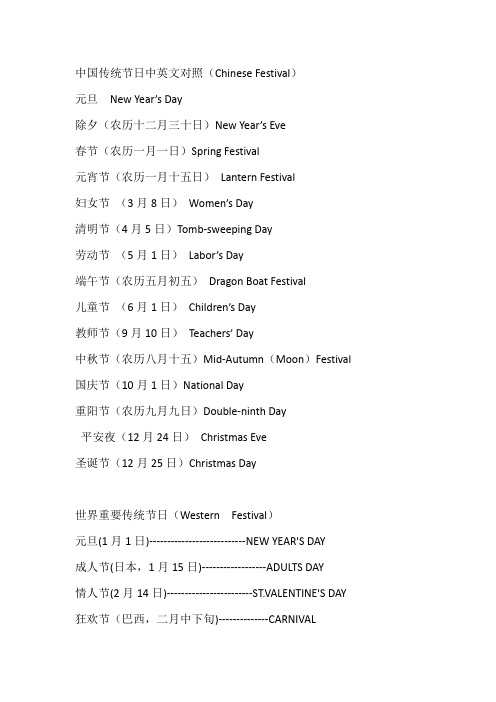
中国传统节日中英文对照(Chinese Festival)元旦New Year’s Day除夕(农历十二月三十日)New Year’s Eve春节(农历一月一日)Spring Festival元宵节(农历一月十五日)Lantern Festival妇女节(3月8日)Women’s Day清明节(4月5日)Tomb-sweeping Day劳动节(5月1日)Labor’s Day端午节(农历五月初五)Dragon Boat Festival儿童节(6月1日)Children’s Day教师节(9月10日)Teachers’ Day中秋节(农历八月十五)Mid-Autumn(Moon)Festival 国庆节(10月1日)National Day重阳节(农历九月九日)Double-ninth Day平安夜(12月24日)Christmas Eve圣诞节(12月25日)Christmas Day世界重要传统节日(Western Festival)元旦(1月1日)---------------------------NEW YEAR'S DAY成人节(日本,1月15日)------------------ADULTS DAY情人节(2月14日)------------------------ST.VALENTINE'S DAY 狂欢节(巴西,二月中下旬)--------------CARNIVAL国际妇女节(3月8日)---------------INTERNATIONAL WOMEN'S DAY 愚人节(4月1日)-------------------------FOOL'S DAY复活节(春分月圆后第一个星期日)---------EASTER国际劳动节(5月1日)-----------------INTERNATIONAL LABOUR DAY 母亲节(5月的第二个星期日)--------------MOTHER'S DAY国际儿童节(6月1日)-------------INTERNATIONAL CHILDREN''S DAY 父亲节(6月的第三个星期日)--------------FATHER'S DAY端午节(阴历5月5日)---------------------DRAGON BOAT FESTIVAL 中秋节(阴历8月15日)--------------------MOON FESTIVAL教师节(中国,9月10日)------------------TEACHER'S DAY敬老节(日本,9月15日)------------------OLD PEOPLE'S DAY南瓜节(北美10月31日)-------------------PUMPKIN DAY鬼节(万圣节除夕,10月31日夜)-----------HALLOWEEN万圣节(11月1日)------------------------HALLOWMAS感恩节(美国,11月最后一个星期4)--------THANKSGIVING圣诞除夕(12月24日)---------------------CHRISTMAS EVE圣诞节(12月25日)-----------------------CHRISTMAS DAD节礼日(12月26日)-----------------------BOXING DAY。
中国传统节日汉英对照
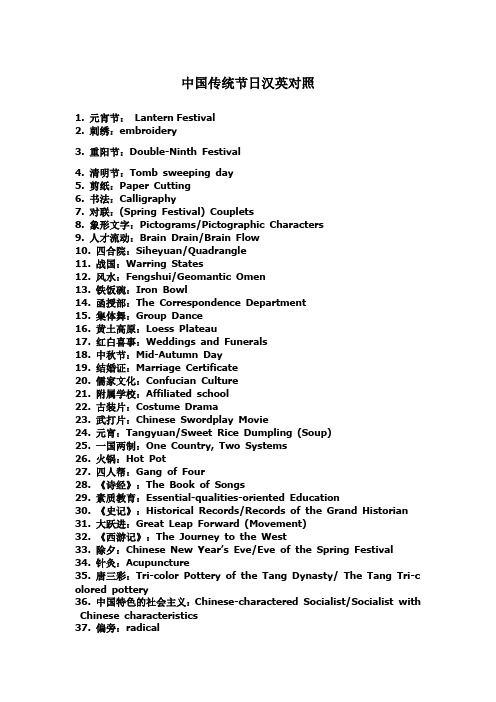
中国传统节日汉英对照1. 元宵节:Lantern Festival2. 刺绣:embroidery3. 重阳节:Double-Ninth Festival4. 清明节:Tomb sweeping day5. 剪纸:Paper Cutting6. 书法:Calligraphy7. 对联:(Spring Festival) Couplets8. 象形文字:Pictograms/Pictographic Characters9. 人才流动:Brain Drain/Brain Flow10. 四合院:Siheyuan/Quadrangle11. 战国:Warring States12. 风水:Fengshui/Geomantic Omen13. 铁饭碗:Iron Bowl14. 函授部:The Correspondence Department15. 集体舞:Group Dance16. 黄土高原:Loess Plateau17. 红白喜事:Weddings and Funerals18. 中秋节:Mid-Autumn Day19. 结婚证:Marriage Certificate20. 儒家文化:Confucian Culture21. 附属学校:Affiliated school22. 古装片:Costume Drama23. 武打片:Chinese Swordplay Movie24. 元宵:Tangyuan/Sweet Rice Dumpling (Soup)25. 一国两制:One Country, Two Systems26. 火锅:Hot Pot27. 四人帮:Gang of Four28. 《诗经》:The Book of Songs29. 素质教育:Essential-qualities-oriented Education30. 《史记》:Historical Records/Records of the Grand Historian31. 大跃进:Great Leap Forward (Movement)32. 《西游记》:The Journey to the West33. 除夕:Chinese New Year’s Eve/Eve of the Spring Festival34. 针灸:Acupuncture35. 唐三彩:Tri-color Pottery of the Tang Dynasty/ The Tang Tri-c olored pottery36. 中国特色的社会主义:Chinese-charactered Socialist/Socialist with Chinese characteristics37. 偏旁:radical38. 孟子:Mencius39. 亭/阁:Pavilion/ Attic40. 大中型国有企业:Large and Medium-sized State-owned Enterpri ses41. 火药:gunpowder42. 农历:Lunar Calendar43. 印/玺:Seal/Stamp44. 物质精神文明建设:The Construction of Material Civilization and Spiritual Civilization45. 京剧:Beijing Opera/Peking Opera46. 秦腔:Crying of Qin People/Qin Opera47. 太极拳:Tai Chi48. 独生子女证:The Certificate of One-child49. 天坛:Altar of Heaven in Beijing50. 小吃摊:Snack Bar/Snack Stand51. 红双喜:Double Happiness52. 政治辅导员:Political Counselor/School Counselor53. 春卷:Spring Roll(s)54. 莲藕:Lotus Root55. 追星族:Star Struck56. 故宫博物院:The Palace Museum57. 相声:Cross-talk/Comic Dialogue58. 下岗:Lay off/Laid off59. 北京烤鸭:Beijing Roast Duck60. 高等自学考试:Self-taught Examination of Higher Education61. 烟花爆竹:fireworks and firecracker62. 敦煌莫高窟:Mogao Caves63. 电视小品:TV Sketch/TV Skit64. 香港澳门同胞:Compatriots from Hong Kong and Macao65. 文化大革命:Cultural Revolution66. 长江中下游地区:The Mid-low Reaches of Yangtze River67. 门当户对:Perfect Match/Exact Match68. 《水浒》:Water Margin/Outlaws of the Marsh69. 中外合资企业:Joint Ventures70. 文房四宝(笔墨纸砚):"The Four Treasure of the Study" "Brush, Inkstick, Paper, and Inkstone"71.兵马俑:cotta Warriors/ Terracotta Army72.旗袍:cheongsam。
中国传统节日及活动英译

中国传统节日及活动英译新年-New Year’s Day春节-Spring Festival三八节-International Working Women’s Day五一节-May Day五四节-Chinese Youth Day六一节-International Children’s Day八一建军节-Army Day中国共产党成立纪念日-Aniversary of the Founding of the Communist Party of China国庆节-National Day元宵节The Lantern Festival清明节The Tomb-sweeping Festival端午节The Dragon Boat Festival中秋节The Mid-Autumn Festival重阳节The Double Ninth Day七夕节The Double Seventh Day西方节日New Year's Day 元旦节、新年Easter Sunday,Easter 复活节Epiphany,Twelfth Day 主显节day of obligation 每人需停止工作参加礼拜的日子Christmas 圣诞节Christmas Eve 圣诞前夕New Year‘s Eve 新年前夕Easter 复活节狂欢节CARNIVAL愚人节APRIL FOOL‘S DAY复活节EASTER食品节FOOD FESTIVAL国际劳动节INTERNATIONAL LABOUR DAY男孩节BOY‘S DAY母亲节MOTHER‘S DAY开斋节LESSER BAIRAM银行休假日BANK HOLIDAY国际儿童节INTERNATIONAL CHILDREN‘S DAY父亲节FATHER‘S DAY 教师节TEACHER‘S DAY感恩节THANKSGIVINGChristmas 圣诞节Christmas Eve 圣诞前夕New Year‘s Eve 新年前夕Easter 复活节All Saints‘ Day 万圣节其它活动节日世界消费者权益日--WORLD CONSUMER RIGHT DAY世界水日-----WORLD WATER DAY世界卫生日-----WORLD HEALTH DAY世界地球日-----WORLD EARTH DAY世界住房日--WORLD HOUSING DAY 国际秘书节----INTERNATIONAL SECRETARY DAY国际红十字日----INTERNATIONAL RED-CROSS DAY世界电信日----WORLD TELECOMMUNICATIONS DAY世界无烟日----WORLD NO-SMOKING DAY世界环境日----WORLD ENVIRONMENT DAY世界人口日---WORLD POPULATION DAY世界旅游日----WORLD TOURISM DAY世界邮政日----WORLD POST DAY 世界粮食日-----WORLD GRAIN DAY世界爱滋病日-----WORLD AIDS DAY世界残疾日------WORLD DISABLED DAY。
中国传统节日中英对照

中国传统节日中英对照1.New Year's Day元旦(1月1日)2.Spring Festival;Chinese New Year's Day春节(农历一月一日)ntern Festival元宵节(农历一月十五日)4.International Working Women's Day国际劳动妇女节(3月8日)5.Arbor Day植树节(3月12日)6.Postal Day邮政节(3月20日)7.World Meteorology Day世界气象节(3月23日)8.Ching Ming Festival ;Tomb-sweeping Festival清明节(4月5日)9.International Labour Day国际劳动节(5月1日)10.Chinese Youth Day中国青年节(5月4日)11.Nurses' Festival护士节(5月12日)12.Dragon Boat Festival端午节(农历五月初五)13.International Children's Day国际儿童节(6月1日)14.The Party's Birthday 中国共产党成立纪念日(7月1日)15.The Army's Day建军节(8月1日)16.Mid-Autumn (Moon)Festival中秋节(农历八月十五)17.Teacher's Day教师节(9月10日)18.Double-ninth Day重阳节(农历九月九日)19.National Day国庆节(10月1日)20.New Year's Eve除夕(农历十二月三十日)美国1.元旦节(New Year's Day),每年1月1日庆祝新的一年开始。
人们举办各种各样的新年晚会,到处可以听到"辞旧迎新"的钟声,为美国的联邦假日。
2.林肯诞辰(Abraham Lincoln's Birthday), 每年2月12日,庆祝林肯诞辰,为大多数州的节日。
- 1、下载文档前请自行甄别文档内容的完整性,平台不提供额外的编辑、内容补充、找答案等附加服务。
- 2、"仅部分预览"的文档,不可在线预览部分如存在完整性等问题,可反馈申请退款(可完整预览的文档不适用该条件!)。
- 3、如文档侵犯您的权益,请联系客服反馈,我们会尽快为您处理(人工客服工作时间:9:00-18:30)。
中国常见传统活动中英对照
• 舞狮 lion dance (the lion is believed to be able to dispel evil and bring good luck.) • 舞龙 dragon dance (to expect good weather and good harvests) • 戏曲 traditional opera • 杂耍 variety show • 灯谜 riddles written on lanterns • 灯会 exhibit of lanterns • 守岁 staying-up • 拜年 pay new year's call;give new year's greetings; pay new year's visit
中国常见传统活动中英对照
• 禁忌 taboo • 去晦气 get rid of the ill- fortune • 祭祖宗 offer sacrifices to one's ancestors • 压岁钱 gift money;money given to children as a lunar new year gift culture
中国传统节日中英对照
1.春节(农历一月一日) Spring Festival;Chinese New Year's Day 2. 元宵节(农历一月十五日) Lantern Festival 3. 清明节(4月5日) Tomb-Sweeping Day 4. 端午节(农历五月初五) Dragon Boat Festival 5.中秋节(农历八月十五) Mid-Autumn (Moon)Festival 6. 重阳节(农历九月九日) Double-ninth Day 7.. 除夕(农历十二月三十日)New Year's Eve
note;in the old days, new year's money was given in the form of one hundred copper coins strung together on a red string and symbolized the hope that one would live to be a hundred years old. today, money is placed inside red envelopes in denominations considered auspicious and given to represent luck and wealth
中国常见传统活动中英对照
• 过年 celebrate the spring festival
• • • • • • • • • 春联 spring festival couplets 剪纸 paper-cuts 年画 new year paintings 买年货 do shopping for the spring festival;do spring festival shopping 敬酒 propose a toast 灯笼 lantern 烟花 fireworks 爆竹 firecrackers (people scare off evil spirits and ghosts with the loud pop.) 红包 red packets (cash wrapped up in red paper,symbolize fortune and wealth in the coming year.)
中国常见传统活动中英对照
• • • • • • • 辞旧岁 bid farewell to the old year 扫房 spring cleaning; general house-cleaning 年糕 nian-gao; rise cake; new year cake 团圆饭 family reunion dinner 年夜饭 the dinner on new year's eve 饺子 jiao-zi/dumpling; chinese meat ravioli 粽子 rice dumpling
